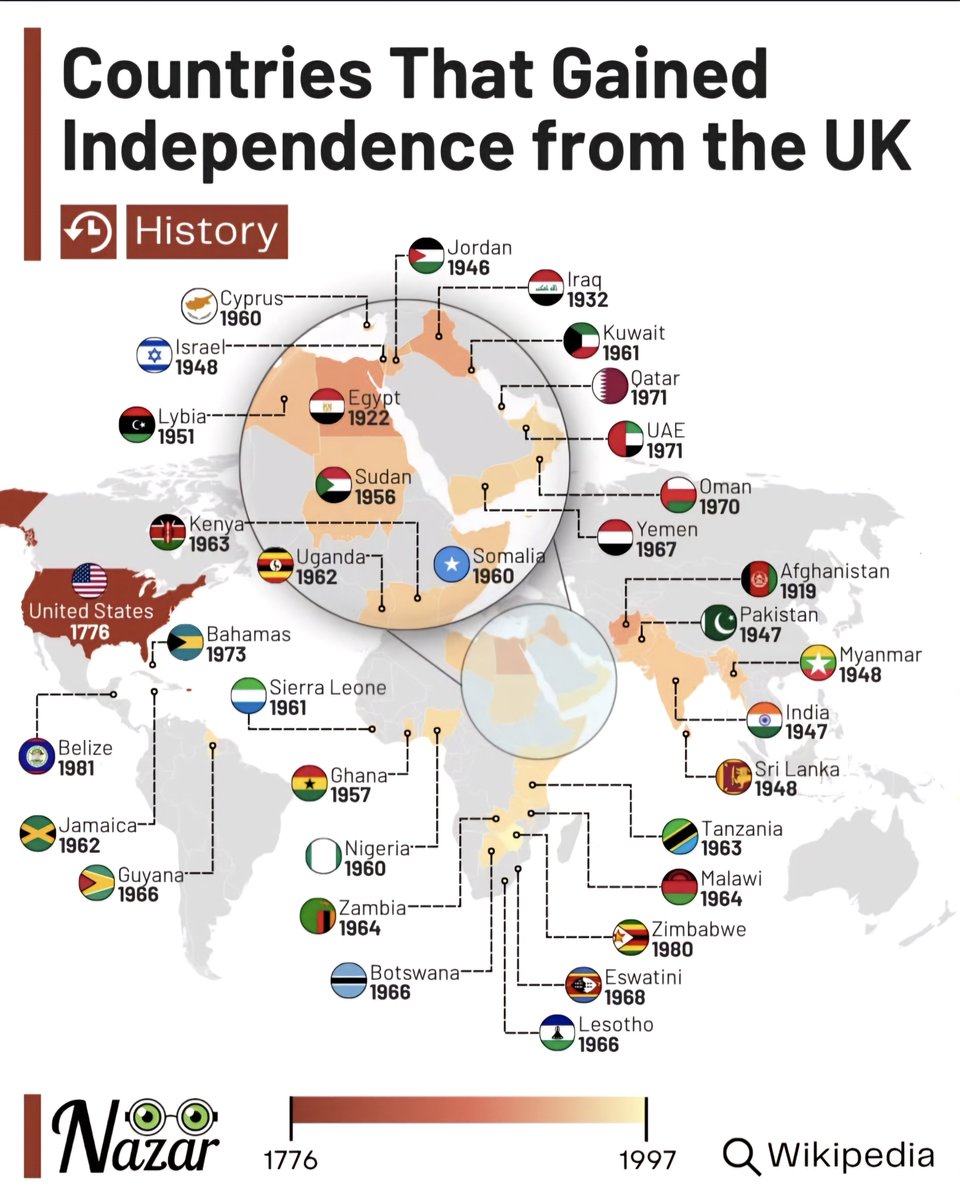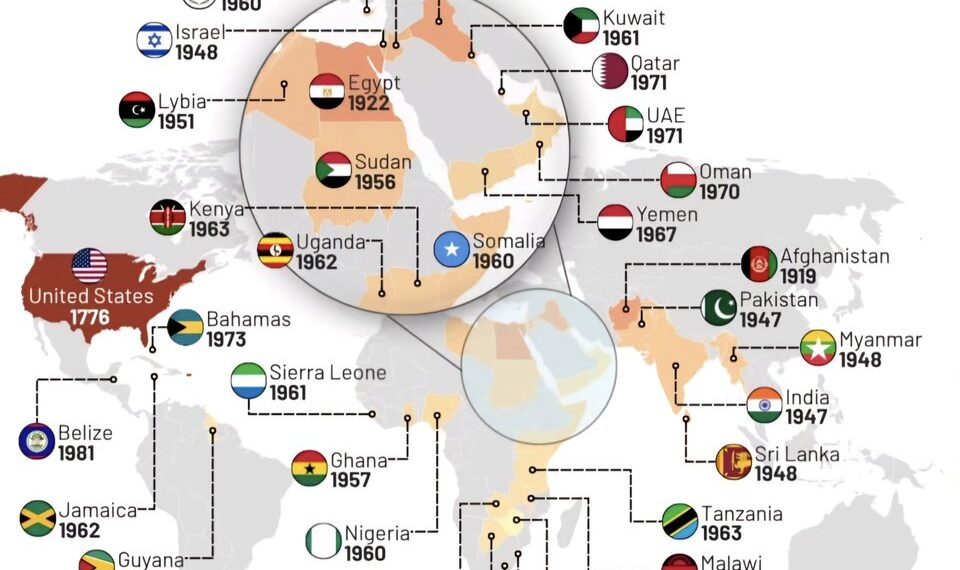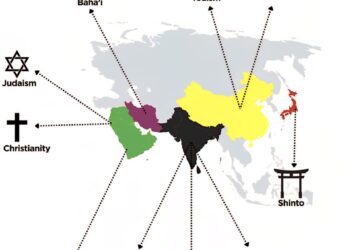Select Language:

Top 35 Countries That Gained Independence From the UK in 2025
1. United States (1776)
The United States marked its independence from British rule in 1776, a historic milestone that laid the foundation for the nation’s democratic government and the pursuit of liberty. The Declaration of Independence, crafted largely by Thomas Jefferson, symbolized a revolutionary break from colonial dominance, inspiring independence movements worldwide and shaping American identity.
2. Afghanistan (1919)
After centuries of Mughal, Persian, and British influence, Afghanistan achieved independence in 1919 following the Third Anglo-Afghan War. The Treaty of Rawalpindi formalized its sovereignty, marking a significant step toward national self-rule. Despite ongoing conflicts, 2025 commemorates Afghanistan’s long-standing struggle for independence and sovereignty.
3. Egypt (1922)
Egypt gained partial independence from Britain in 1922, ending the British protectorate. Although the UK retained some military influence until later in the century, Egypt charted its own political course, culminating in full sovereignty in the 1950s. Today, Egypt celebrates its independence as a milestone of national pride and resilience.
4. Iraq (1932)
In 1932, Iraq officially claimed independence from British oversight following a mandate period established after World War I. The move allowed Iraq to develop its government institutions, despite ongoing regional and internal challenges. Its journey toward full sovereignty continues to shape its national identity.
5. Jordan (1946)
Jordan achieved independence from British colonial rule in 1946, becoming the Hashemite Kingdom. The country’s sovereignty established Queen Noor’s modern monarchy, promoting stability and development in a geopolitically sensitive region, especially amidst ongoing Middle Eastern conflicts.
6. Pakistan (1947)
Born from the partition of British India, Pakistan declared independence in 1947 as a separate nation for Muslims seeking self-governance. Its establishment marked a significant shift in regional power dynamics, leading to development, political upheavals, and adaptation over the decades.
7. India (1947)
India’s independence in 1947 was a watershed moment, ending nearly two centuries of British rule. Led by Mahatma Gandhi and Jawaharlal Nehru, the nation’s peaceful struggle culminated in the creation of a sovereign nation committed to democracy and diversity—an enduring legacy celebrated annually.
8. Israel (1948)
Though not a British colony, Israel’s establishment in 1948 followed the British Mandate of Palestine. The United Nations recognized Israel’s sovereignty, igniting a complex regional conflict that remains ongoing. The historic declaration signifies a pivotal moment in the Middle East’s history.
9. Myanmar (1948)
Myanmar, formerly Burma, gained independence from Britain in 1948. The nation’s journey toward governance has been tumultuous but pivotal in shaping its national identity, setting the stage for decades of political change and ongoing efforts for stability.
10. Sri Lanka (1948)
Sri Lanka, then Ceylon, achieved independence from Britain in 1948. The transition marked a key step toward self-rule, fostering cultural revival and economic development. Today, Sri Lanka commemorates its independence as a testament to resilience and national unity.
11. Libya (1951)
Libya’s independence in 1951 from Italian and British influence marked a new chapter in its history. The nation’s founding of the Kingdom of Libya signified efforts towards national consolidation and sovereignty, which continue to influence Libya’s political landscape today.
12. Sudan (1956)
Sudan’s independence in 1956 was a major milestone after decades of Anglo-Egyptian control. The move empowered Sudanese sovereignty, setting the stage for subsequent struggles and aspirations for peace and stability across the region.
13. Ghana (1957)
Ghana was the first African nation to attain independence from Britain in 1957, paving the way for decolonization across the continent. Kwame Nkrumah’s leadership inspired freedom movements and democratic institutions that persist today.
14. Cyprus (1960)
Cyprus gained independence from Britain in 1960, establishing a republic amid tensions between Greek Cypriots and Turkish Cypriots. The island’s sovereignty has faced ongoing challenges, but 2025 marks an important anniversary of its national independence.
15. Nigeria (1960)
Nigeria’s independence in 1960 ended centuries of colonial rule, laying the groundwork for a diverse, multi-ethnic nation. Like many others, Nigeria continues to develop its democratic institutions and national identity.
16. Somalia (1960)
In 1960, Somalia declared independence from Britain and Italy, uniting as the Somali Republic. Its political journey has been complex, shaped by regional conflicts, yet independence remains a symbol of Somali resilience.
17. Sierra Leone (1961)
Liberty was officially proclaimed in Sierra Leone in 1961, after decades under British rule. The nation’s independence reflects the perseverance of its people in building a sovereign state.
18. Kuwait (1961)
Kuwait’s independence from Britain in 1961 marked its emergence as a sovereign state rich in oil resources. Maintaining stability and sovereignty has been vital to its development and regional influence.
19. Uganda (1962)
Achieving independence from Britain in 1962, Uganda embarked on nation-building amid internal and external challenges. It now strives for stability and economic growth, commemorating this milestone with pride.
20. Jamaica (1962)
Jamaica’s independence in 1962 signified the end of British colonial rule, paving the way for its distinct national identity and cultural vibrancy. Today, it remains a proud member of the Commonwealth.
21. Kenya (1963)
Kenya’s independence in 1963 marked the culmination of years of struggle against colonial rule. Today, Kenya champions progress, with a rich culture rooted in its fight for sovereignty.
22. Tanzania (1964)
Formed from the union of Tanganyika and Zanzibar, Tanzania gained independence in 1964. Its mosaic of cultures and history continues to thrive as an independent nation.
23. Malawi (1964)
Malawi, formerly Nyasaland, gained independence in 1964, following a peaceful push for sovereignty. Its progress in agriculture and education highlights its ongoing development journey.
24. Zambia (1964)
Achieving independence in 1964, Zambia emerged as a symbol of anti-colonial resistance and has since strived for economic progress amid regional challenges.
25. Botswana (1966)
Botswana’s independence in 1966 marked the start of stable governance and diamond-fueled economic growth, setting an example for good governance in Africa.
26. Lesotho (1966)
Lesotho gained independence in 1966, becoming a constitutional monarchy. Its peaceful transition laid the foundation for continued democracy and development.
27. Guyana (1966)
Guyanese independence in 1966 signaled an end to colonial rule, fostering a multicultural society proud of its heritage and sovereignty.
28. Yemen (1967)
Yemen’s independence from British colonial influence in 1967 was pivotal, leading to the establishment of the Yemen Arab Republic and ongoing national reunification efforts.
29. Eswatini (1968)
Eswatini, formerly Swaziland, declared independence in 1968. It maintained its monarchy and sovereignty through evolving political landscapes.
30. Oman (1970)
Oman’s independence in 1970 concluded British influence, allowing the Sultanate to focus on modernization and internal stability.
31. Qatar (1971)
Qatar gained independence from Britain in 1971, transforming from a small pearling and trading hub into a global energy powerhouse.
32. United Arab Emirates (1971)
United Arab Emirates united in 1971, establishing a federation of seven emirates, now a regional economic and strategic hub.
33. Bahamas (1973)
The Bahamas’ independence in 1973 turned it into a sovereign nation, known worldwide for tourism and maritime beauty.
34. Zimbabwe (1980)
Zimbabwe’s independence in 1980 marked the end of white minority rule and the start of a new era of political sovereignty under Robert Mugabe’s leadership.
35. Belize (1981)
Belize secured independence in 1981, transitioning from British Honduras to an independent nation renowned for its natural beauty and cultural diversity.
Source: Wikipedia, 2025






